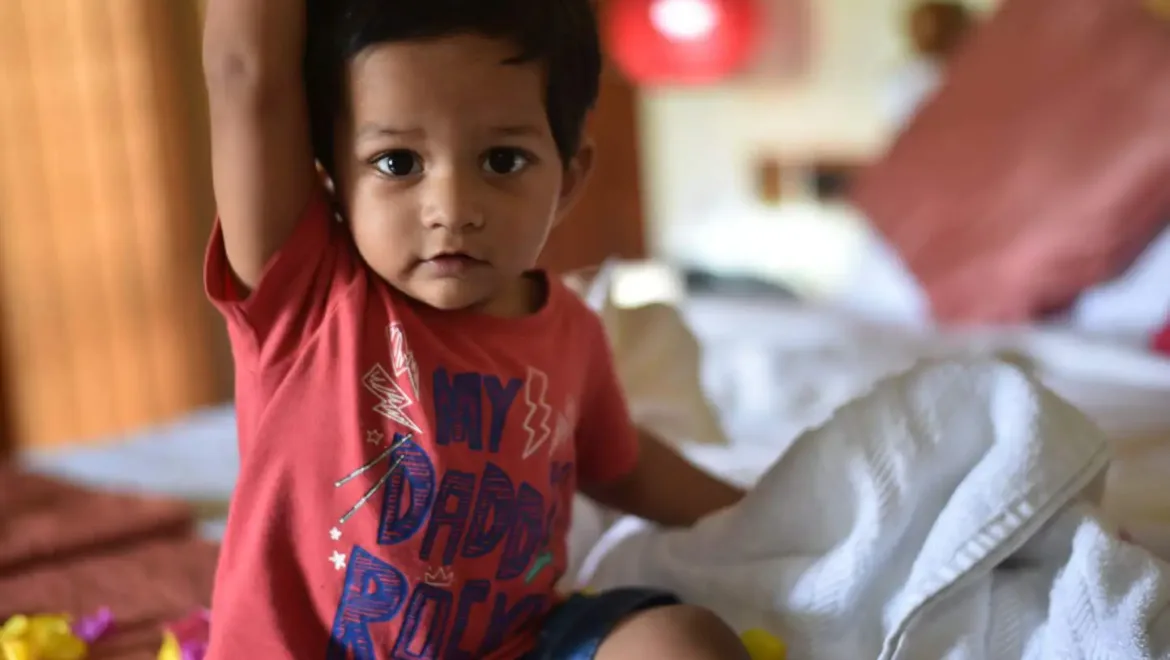In any experience good or bad is an emotion, and in an emotion is the gift of life. Without emotions we could not give meaning to our world. However, the world around is not always flowers or sunshine. Very often our emotions put us in a deep dark place which is dismaying for one to look at. However, that does not mean that we must act on our emotions or deny having them at all. Mostly we cannot calm the storm, but what one can do is calm ourselves. Emotional stability is thus vital to a good life. It is the ability to not let our emotions take charge over us even in the direst of circumstances. In general, many of our children’s emotions get overlooked as we tend to pay more attention to how they are behaving than how they are feeling. Placing immense focus on developing good habits and manners we tend to assume that the know-how of emotions and the ability to handle feelings that overwhelm our little ones would develop as they explore the world on their own. In the process we become derailed from setting the foundations for a healthy and emotionally rich adult lives.
Behavioral changes like the child spending excessive amount of time on video games, television or playing, crying invariably on little things, zoning out of the social environment etc. are likely to bother us a lot. However, it is important to know that just as other behaviors these also have an underlying emotion that is struggling to manifest itself in the right manner. Acknowledging our kids’ emotions and staying calm might become difficult in situations when they are themselves driving us crazy. However, as adults we must always remember that our behavior to them reflects how the world is. Unlike us, children have a small world where what you say and do is as important to them as our preoccupations are to us. You don’t know what they might choose to act over, so the solution here is simple- Fill them with love, Hope and Confidence and that’s what they will pour out all their lives.
It is not surprising to know that a lot of mental health issues like anxiety, self-doubt, low self-esteem, trust issues or problems with self-expression correlates to unhealthy parenting styles and traumatic childhood experiences. Simply put, our little ones at their age find themselves incapable of handling overwhelming life situations and in response to the suffering or hurt in the initial stages of life they develop hard wired belief systems and defenses against the reality. Underlying causes to problems like these may not always come from extreme events like abuse, parental dispute or divorce. Small steps that we do today add on to the larger picture of their lives. It is therefore essential that as parents we become mindful of the behavior we are modelling for their future personalities. Emotional stability and management are thus important to cultivate right from the beginning.
One of the easiest and most important things to do in any problem scenario is connecting. As parents we must work to enhance their ability to share what they feel. Many times, it is likely that something needs attention and perhaps they themselves also haven’t made sense of what it is. It is thus necessary that we become vigilant of their emotions as they react differently in situations. We must be able to reassure our kids of what they are feeling is alright and natural to experience. Placing ourselves in a position where we let them know that we are concerned about their emotional struggles improves emotional awareness and expression in kids.
Just as important to reinforcing expression is ensuring respect and compassion for their feelings. Acting erratically or defensively when approached gives them good reasons to not share it out the next time they are agitated. As adults we must not fail to keep up the child’s trust in being able to communicate with us. During this process the worst we can do is trivializing their emotions. As parents we do listen to our child’s issues however emotional passivity is not a great thing to offer. It is natural to listen to incidences where your child is upset about hurting his knee or fighting with his friend and feel that the children need to toughen themselves. However, when we say “Arey! Ye sab toh hota rehta hai koi baat nahi, kuch nahi hai… Brave boy!” we unconsciously make them feel out of place. A cycle of dialogues like these can ultimately lead children to decide that feelings of hurt or pain are nothing for others, if not them. Therefore, as we grow up, we tend to express our disappointment or hurt by suffering alone essentially because others would not understand your feelings is an established concept by that age.
As equal partners in choosing the right strategy to deal with their emotions we must be keen to ensure that we are in no way conditioning them to think that their emotion is the problem here. Instead, understanding and sharing their disappointment no matter how small it for you is a great way to promote emotional health.
Unknowingly we do this a lot of times when we try to calm an angry or cranky child. It is good to give the child a sense of what he is doing is wrong. However, when we talk to a child who is clearly bashing out with anger saying- “Beta, us din bhi aap ro rahe the na… neighbour aunty keh rahi thi Raashi toh bad girl hai. Aap bad girl thodi na ho… ese rote nahi hai”; we wrongfully move the focus from the child’s distress to ideas of wrong and right doings. Things said to us when we are in an emotionally aroused state have a far-reaching impact on us. As adults we must be mindful of what we are trying to convey to the child. In such a scenario, understanding their immediate concern compassionately and then offering a better set of ways to express it the next time they feel upset is a better approach to the situation.
Without a doubt, Express and communicate your problems with them too and look for genuine answers. Highly attuned to their parent’s emotional states the children would learn to mask their feelings into pleasant ones if you continue to keep your problems from the kids. Instead, putting across your hassles to them empowers them to think that they are equally valued and important in your life decisions. How we treat our children is how they will treat themselves. The words we say to them continue to play in their heads for a lifetime. It is therefore that at this very early age we shall teach our children to see themselves positively.
Talking out the things that went well is equally important as talking out their problems for ensuring a balanced view of the world for them. The ritual to share our problems only dangerously moves our focus from the good parts in life to the bad ones.
When they are in an age where they still fear that the old man would take them away if they don’t sleep in time, validating and appreciating their opinions is a direct boost to their self-esteem. Sometimes parents don’t make their feelings clear, they assume that their children know of the deep love they feel for them. Yet when problems occur the things left unsaid in periods of- “Ab aapse koi bhi baat nahi karega… aaj aapne bohot bura behave kia hai” leads to needless doubts and insecurities.
Children need a safe, predictable and fair environment. Homes with rules that are harsh or inconsistent harbor feelings of anger and anxiety in children. Already a pool of insecurities the children struggle to figure out why they are being treated a way and what could make this experience better for them. It is thus important that we set rules and boundaries keeping in mind the child’s age, allow them to question its importance and have good reasons to back up our decisions. The best punishment is reasonable, humane and that directly relates to the consequence of the problem behavior. A lot of difference is made when we convey efficiently that it is the mistake that is the problem which is only a part of the child, and that he is still loved and wanted equally as before.
Emotional imbalances are often triggered by low self-esteem which indeed can lead to a lot of emotional problems. Condemn the act of misconduct and not the child, as we grow up a lot of people try to pull us down however it is this inner strength that you instill is what will serve them well in their future struggles. A child with a good sense of self-worth is equipped to deal with the challenges of growing up and will also be less inclined to indulge in mal-adaptive or risky behavior like speed riding, smoking, binge eating or bullying etc., just to make him feel good about himself.
Kids indeed teach us a lot of patience. It is the parent’s patience that helps them teach the same things repeatedly with heartfelt concerns and genuine intentions. A wonderfully little things to offer our toddlers while communication is also patience. Children taking time to think, re-think, re-framing, fumbling and trying to give a simple one-line answer is a beautiful site. Keen to convey our message we very usually miss out on the pauses that our kids deserve to tell us their side of the story. Resisting the temptation to tame their spirits and following our questions with pauses that allow the kid to think and put forward his mind is extremely important. While asking- “Raashi, aapne Inaaya ko kyun maara? Usne kuch kaha aapko pehle? Aapko samjhaya tha na maarte nahi hai”, we conveniently shut their doors of possibilities which if allowed to work on and express, the child would understand his triggers better. The responses we get could also be awe-inspiring in true sense. As we acknowledge and validate their concerns, we model tolerance, patience and respect. At the same time, we also allow our children to detoxify themselves of any heavy and troublesome feelings that may have been bothering them, in a space they can confide in.
The behavior our kids portray is always understandable if we see it through a positive lens. If we connect deeply with the child it is our responsibility to make him realize that he does not have to behave aggressively or erratically to call for love, attention or to express their love or anger. Misbehaving with the younger child or howling at the airport because his father is leaving for a trip are behaviors typically calling out for attention and love. Punishing the child for this would only heighten his terror of abandonment or not being good enough.
The incredible gift of emotional stability can thus be passed to our kids simply if we resist acting on the mercy of our momentarily emotions.
That is how they will know unconditional love and the strength to see the truth in their beauty…

